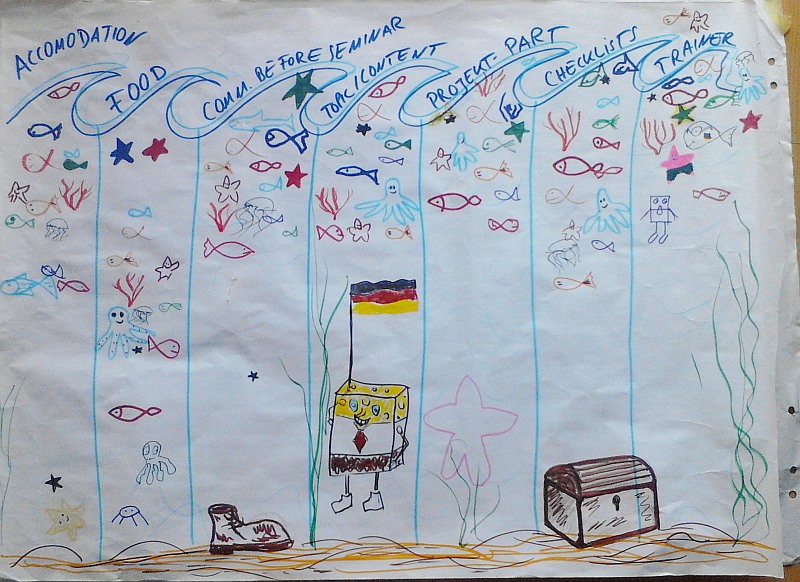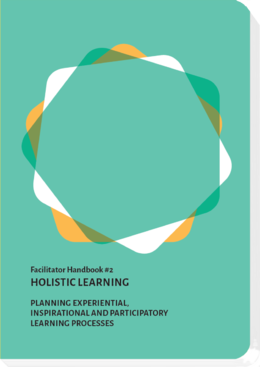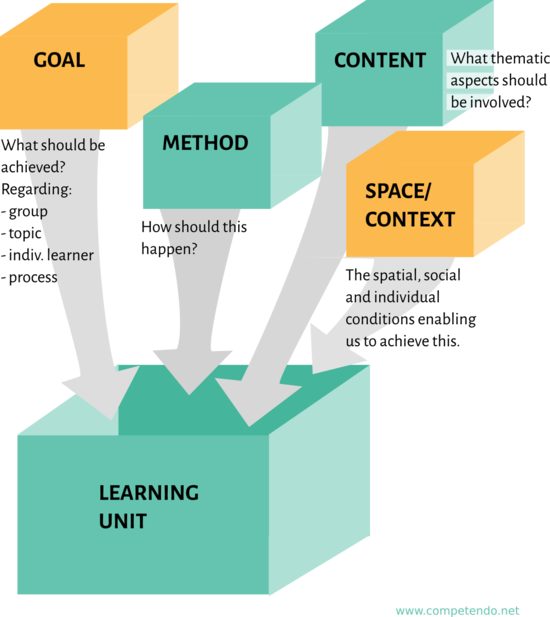 N. Zimmermann/ H. Fahrun
N. Zimmermann/ H. Fahrun
Evaluation is the structured interpretation and giving of meaning to predicted or actual impacts of proposals or results. It looks at original objectives, and at what is either predicted or what was accomplished and how it was accomplished. So evaluation can be
formative, that is taking place during the development of a concept or during a seminar, with the intention of improving the value or effectiveness of the proposal of the project. It can also be
assumptive, drawing lessons from a completed action of the project or a finished seminar.
Focuses of reflection
Goal Achievement
- Regarding the interaction and cooperative learning in the group
- Relevant topical aspects and how they were covered
- Individual learning/development goals (in particular competency development, see below)
- The collective learning process
|
Methodology
- The choice of methods and their mix
- The ability of facilitators to implement their methodological concept
- Process moderation
|
Space/Context
- Space: Ability to learn, to cooperate, to meet, to feel well accommodated
- Ability to satisfy individual needs inside and outside the scheduled activities: social, cultural/spiritual, physical, intellectual, emotional
- In particular satisfaction of special needs
- Inclusion of the local environment: in seminar work, in topical aspects
|
Competency development
- Participant's acquisition of competencies
- Participant's development towards feeling self-empowered and their ability to democratic participation
- Your acquisition of competencies as a facilitator
|
Management
- Event management. logistics and timing
- Cooperation within the facilitation team
|
Participative Evaluation of Learning
There are situations where we don't like to face critical thinking, when we are tired after intensive days of facilitating, when we face confrontative discussions. On the other hand decisions are only good decisions when they reflect all perspectives. Having a diverse group in a seminar means having different tastes and impressions. Making the seminar relevant for all those individuals is a difficult task. Realizing this and accepting the gap between your planning and your realistically evaluated results is an important step. It’s your challenge of making the gap smaller.
An overview over different methods for evaluation for evaluation in between and at the end of a learning process.
Reflection and evaluation are inherent parts of the educational processes. They both can be divided into categories: within the facilitators’ team and between the facilitators’ team and the participants. Here we offer definitions for both of these terms.
This page gives you criteria and inspiration for the selection of methods for evaluating and reflecting learning processes.
Here you can find a self-assessment checklist for facilitators.
Reflecting Teamwork
Within a learning process trainers are during the whole time busy. They conduct the training steps, prepare their units and plan the next steps. And what is a leisure activity for their participants is sometimes as well a kind of duty - to mix with participants getting-to-know more about their needs, wishes and experience which they have no space to show in the concrete program activities. This energy-taking tasks should not prevent groups of facilitators to reflect and assess their cooperation. In regular team meetings it is time to reflect the teamwork until now, to evaluate it and to apply the plans for the next steps according to the needs of the team members.
“A teamwork makes the dream work” said someone once. We tweak it like this "reflective and constructive teamwork makes a seminar work".
Navigation:
 After
After
Example: Aquarium
 A cooperative evaluation in a training. Each participant marks his or her fish. Near the surface means +, at the ground means -.
A cooperative evaluation in a training. Each participant marks his or her fish. Near the surface means +, at the ground means -.
Evaluation is the structured interpretation and giving of meaning to predicted or actual impacts of proposals or results.
Our Handbooks

E. Heublein, N. Zimmermann
Holistic Learning
Second Handbook for Facilitators: Read more
![]() N. Zimmermann/ H. Fahrun
N. Zimmermann/ H. Fahrun
 A cooperative evaluation in a training. Each participant marks his or her fish. Near the surface means +, at the ground means -.
A cooperative evaluation in a training. Each participant marks his or her fish. Near the surface means +, at the ground means -.








